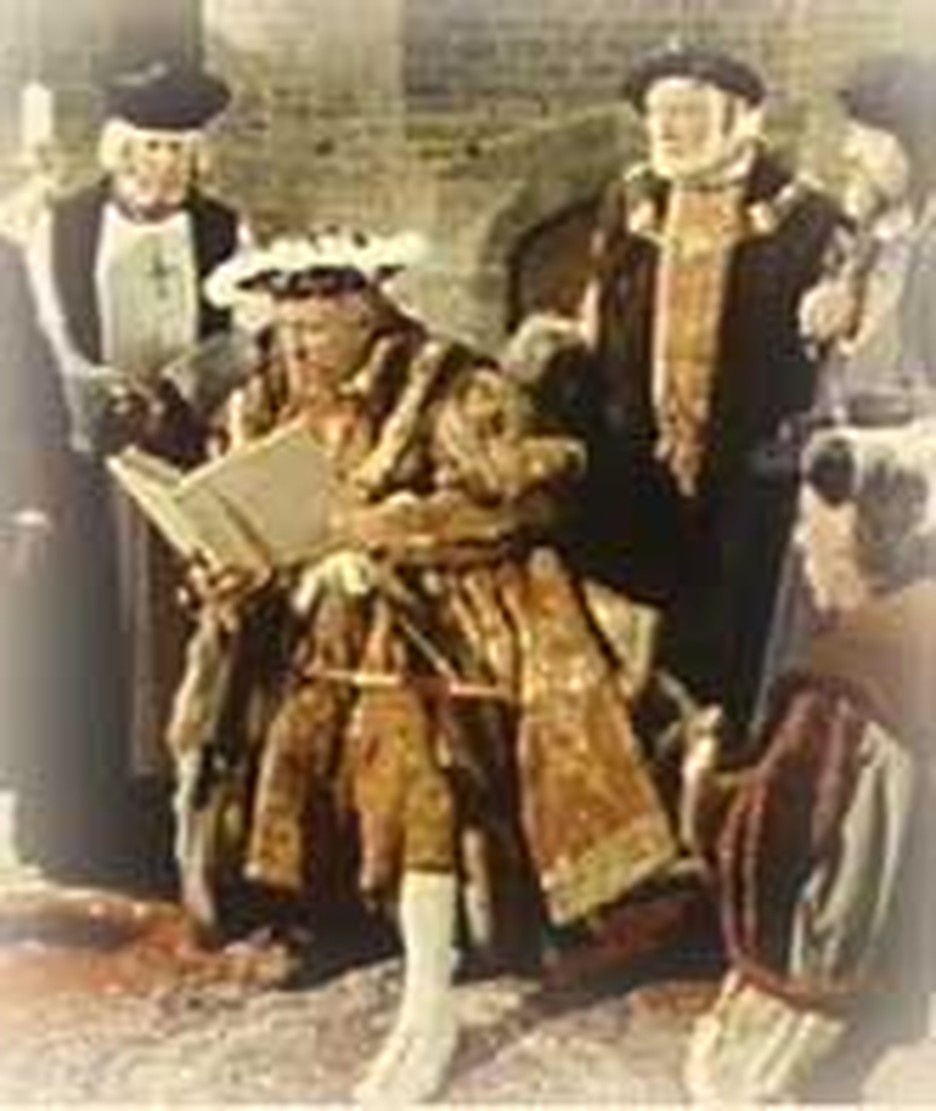
It was a big event in the little town of Chelmsford in Essex, England in 1541. An English Bible had been placed in the parish church! On Sundays many of the people sat around the Bible and listened to the reading of the Scriptures.
William Malden was fifteen, and he loved to listen to the Scriptural readings, but his father took him away. William determined he would learn to read so he could read the Scriptures himself. On Sundays he diligently studied his English primer. In the spring he and his father's apprentice, Thomas Jeffrey, pooled their money and together secretly bought an English New Testament. They hid it in their bedstraw and read it whenever they could. When William's father discovered this, William received a good beating! Why?
The Bible in English was still something new, and it took time for it to be accepted. In May, 1541, King Henry VIII ordered that a copy of the Bible in English be placed in every parish church with instructions that the Scriptures were to be read "humbly and meekly, reverently and obediently." The Great Bible placed in the churches was basically a revision of Tyndale's translation done by Myles Coverdale. However, King Henry intended these Bibles to be used in the churches under the watchful eye of the church, and he still restricted the private use of the Bible. In 1543 Parliament prohibited all of Tyndale's translations and said no woman, except a noble or gentlewoman, no journeyman, no farmer or servant should read the Bible "under pain of imprisonment." There was still a fear that those not properly educated might misread the Scriptures and fill their minds with error - and so William Malden got a beating from his father for having a Bible!
New Monarchs, New Policies
When Henry's son Edward became king, there was an important change as
Edward exhorted the clergy to encourage every person to read the Bible
"as the very lively word of God, and the special food of man's soul
that all Christian persons are bound to embrace, believe, and follow,
if they look to be saved."
Edward's reign was brief, and when his half-sister Mary became queen, she did not allow any official use or printing of the Bible in English. Many Christians fled to the continent as Queen Mary tried to restore the Catholic faith to England. There a new English translation was made in Geneva in 1557. The Geneva Bible became popular with many Reform-minded Christians, and it was the Bible usually favored by the growing Puritan party. These Christians returned to England when the Protestant Elizabeth became queen in 1558.
Queen Elizabeth tried to restore the Church of England to the practices of her father, King Henry VIII. The Great Bible was again placed in the churches, but the bishops did not like Tyndale's translation. Tyndale had used the words congregation for church, love for charity, and seniors or presbyters for priests . The bishops wanted a more traditional, ecclesiastical translation, so in 1568 they had printed what was known as the Bishops' Bible. Bible reading continued to increase in Queen Elizabeth's reign, and the number of Bibles in the hands of the common people multiplied. The people generally used the Geneva Bible, while church officials generally used the Bishops' Bible. The Bible was beginning to lay hold on the people and influenced life, speech and politics. Many wanted a common translation which could be used by all the English people.
Enter King James
The opportunity seemed ripe when James VI of Scotland assumed the throne
of England as James I. The Puritans presented King James with a list of
grievances they had about the Church of England, and King James scheduled
a conference at Hampton Court to discuss these on January 14-16, 1604.
Dr. John Rainolds, President of Corpus Christi College, Oxford, urged
a new improved translation of the Bible into English. King James especially
liked the resolution that the new translation would be free of marginal
notes, since he thought the marginal notes of the Geneva Bible were sometimes
dangerous, and often bordered on being traitorous. By the middle of the
summer of 1604, King James had appointed fifty-four scholars to translate
the Bible. The translators were divided into six companies, with each
given responsibility for one section of Scripture. Oxford, Cambridge,
and Westminster each had two companies of translators. Each individual
in the group translated the same portion of Scripture, went over it until
he was satisfied, and then submitted it to the group. The group then discussed
it and decided on the best translation. When each group had completed
one book, it was sent to the other groups to be considered again. Any
doubts or differences of one group was given to the group which made the
translation. If the groups could not agree, the translation was decided
by a meeting of the leaders of each company, who would seek the advice
of the scholars on particularly obscure points. The translators worked
from the best Greek and Hebrew manuscripts then available, but they also
freely consulted commentaries and earlier English translations. They continually
worked at improvements, bringing "back to the anvil that which we
had hammered."
What they finally presented to the King in 1611 became known as the Authorized or the King James Version of the Bible. It was the work of many and the culmination of over ninety years of English Bible translation, often paid for with the blood of martyrs. The King James Version became the Bible of the English nation and empire. For millions, from the American frontier to the Australian and African bush, it was the only book ever read. It has touched and transformed lives from every class of society, and it is among England's greatest national treasures.
"Shakespeare" in the Bible? |


